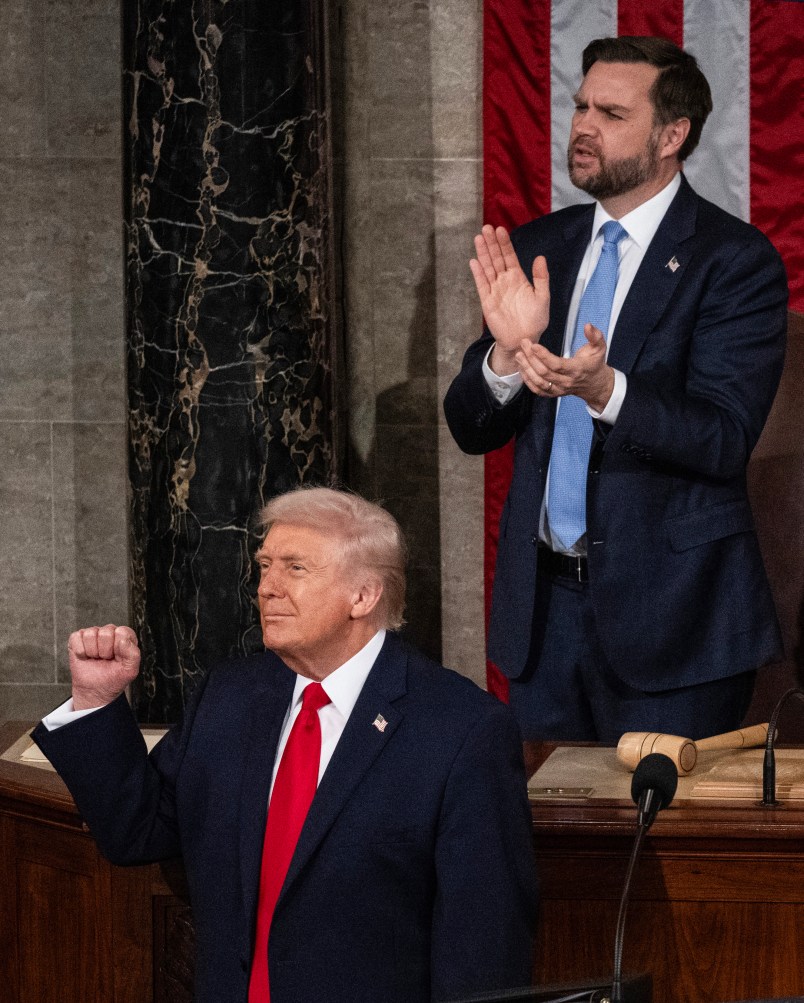
The extent of the prosecutorial and investigative misconduct in the James Comey case is even greater than previously known, a federal magistrate judge revealed in an extraordinary new ruling today.
The judge was tasked with deciding whether Comey had met the very high bar for a defendant to be given full access to the transcripts and recordings of a grand jury proceeding. But it turns out that in addition to the reasons Comey argued for access to the grand jury material, the judge found from his own review of the materials a host of new problems that could ultimately lead to the dismissal of the case.
The ruling by Judge William E. Fitzpatrick of the Eastern District of Virginia is akin to multiple torpedos hitting below the waterline of the Comey prosecution. Most notably, for the first time, Fitzpatrick revealed publicly that U.S. Attorney Lindsey Halligan – the insurance lawyer with no prosecution experience who used to represent Trump personally – made at least two legally improper statements to the grand jury.
Halligan’s exact statements are redacted in the ruling, but in one instance she apparently responded to grand jurors’ questions with an answer that undermined Comey’s 5th Amendment right against self-incrimination. Halligan’s answer may have caused grand jurors to believe that “the burden shifts to Mr. Comey to explain away the government’s evidence,” the judge wrote.
In another instance, Halligan “clearly suggested to the grand jury that they did not have to rely only on the record before them to determine probable cause but could be assured the government had more evidence – perhaps better evidence – that would be presented at trial.”
The improper statements to the grand jury constituted just one of 11 independent reasons that the judge found for ordering the government to provide the grand jury materials to Comey.
The judge did not delve into the possible reasons or motives for the statements made by the inexperienced Halligan: “[T]he Court is finding that the government’s actions in this case – whether purposeful, reckless, or negligent – raise genuine issues of misconduct, are inextricably linked to the government’s grand jury presentation, and deserve to be fully explored by the defense,” the judge wrote broadly about all 11 of his findings in favor of Comey.
The other stunning revelation — though it started to become apparent on Friday — is that Halligan’s own description of how she handled the grand jury and the paperwork of the indictment is now a separate basis for allowing Comey access to grand jury materials.
The judge — like most observers — had thought that after the grand jury returned a no-true bill on one of the three counts in the initial indictment sought by Halligan, she then presented it with a new two-count indictment.
“The second indictment was a new indictment and therefore the undersigned concluded after reviewing the grand jury transcript that the prosecutor would have presented the second indictment to the grand jury for consideration before it was returned in open court. It now appears that may not have happened.”
But in a declaration Halligan filed Friday, she attested that she had no further contact with the grand jury after her first presentation and before it returned the two-count indictment. The Halligan declaration was intended to clean up some of this mess for the separate judge considering whether her appointment as U.S. attorney was unlawful, but it clearly made more of a mess for the judge considering giving Comey access to the grand jury materials.
After reviewing Halligan’s declaration, Judge Fitzpatrick found that her account of the timeframe that afternoon left insufficient time for her have to drafted, signed, and presented the second indictment to the grand jury while also providing it with legal instructions and a chance to deliberate and render a decision. Either way, the judge wrote, it’s a problem for the prosecution:
If the prosecutor is mistaken about the time she received notification of the grand jury’s vote on the original indictment, and this procedure did take place, then the transcript and audio recording provided to the Court are incomplete. If this procedure did not take place, then the Court is in uncharted legal territory in that the indictment returned in open court was not the same charging document presented to and deliberated upon by the grand jury. Either way, this unusual series of events, still not fully explained by the prosecutor’s declaration, calls into question the presumption of regularity generally associated with grand jury proceedings, and provides another genuine issue the defense may raise to challenge the manner in which the government obtained the indictment.
On the original issues that Comey raised as a basis for accessing the grand jury material, the judge ruled in his favor to the maximum extent possible, arguably going even further than Comey had in finding flaws with the how the government handled some of the evidence in the case.
At issue were four search warrants executed by DOJ in the earlier and separate Arctic Haze investigation during the Trump I presidency. The subject of the search warrants was Columbia University law professor Daniel Richman, a friend of Comey’s who would also end up representing him in a lawyer-client relationship. That made some of the materials covered by the search warrant potentially privileged, creating a whole constellation of issues that are not uncommon in criminal investigations but which the judge found the Justice Department botched in nine different ways.
- The government may have violated the 4th Amendment in how it executed the search warrants in the first place way back in 2019-2020, including taking insufficient steps to protect potentially privileged information and never engaging Comey in the process of how privileged information would be handled, the judge concluded. The judge found nothing in the record to show that the government made any attempt to ascertain what of the materials they seized from Richman was evidence of the crimes for which he was being investigated.
- The government may have violated the 4th Amendment by exceeding the scope of the original search warrants.
- The government may have violated the 4th Amendment by holding the seized materials for so long after the Arctic Haze investigation was closed in 2021 and then searching them anew in 2025 in Comey’s separate case without a new warrant.
- The government may have violated the 4th Amendment by seizing the materials anew in 2025 thus exceeding the scope of the original warrants since Comey was being investigated for different crimes arising from different facts.
- “The government’s potential violations of the 4th Amendment and court orders establish a reasonable basis to question whether the government’s conduct was willful or in reckless disregard of the law,” the judge concluded in opening the door wide to Comey’s already pending vindictive prosecution claim.
- The government’s conduct gives Comey a “reasonable basis” to show he was prejudiced by the use of the seized materials in the grand jury since they were central to the case prosecutors presented.
- Comey may also challenge whether the government took sufficient steps to protect his privileged information, “including the reasons why Mr. Comey was never afforded the opportunity to assert a privilege over his communications until after the indictment was obtained.”
- The government’s sole witness — a FBI agent — was exposed to privileged information shortly before he testified, which gives a “reasonable basis” for Comey to challenge whether the government used privileged information, directly or indirectly, for preparing its grand jury presentation.
- Comey has a “reasonable basis” to question whether the government’s disclosure of potentially privileged information “was willful or in reckless disregard of the law,” especially since the FBI agent who was the sole witness “chose to testify before the grand jury rather than separate himself from the investigation.”
I should note here that the judge hasn’t reached a conclusion on each of these issues yet, but having reviewed the search warrants, the grand jury materials in chambers, and the record before him decided the questions they raised were serious enough to give multiple separate grounds for Comey to seek dismissal of the indictment and to give him access to the grand jury materials as a result.
Still, the judge was not exactly agnostic, using strong language at various times to describe how unusual the government’s conduct in the case has been:
- On the issue of protecting Comey’s potentially privileged communications with his lawyer, the judge wrote: “This cavalier attitude towards a basic tenet of the Fourth Amendment and multiple court orders left the government unchecked to rummage through all of the information seized from Mr. Richman, and apparently, in the government’s eyes, to do so again anytime they chose.”
- On not getting a new search warrant in 2025 to review the seized material anew: “Inexplicably, the government elected not to seek a new warrant for the 2025 search, even though the 2025 investigation was focused on a different person, was exploring a fundamentally different legal theory, and was predicated on an entirely different set of criminal offenses.”
- On the government’s possible motive for not seeking a new search warrant: “The Court recognizes that a failure to seek a new warrant under these circumstances is highly unusual. The Court also recognizes that seeking a new warrant under these circumstances would have required a fresh legal analysis and likely resulted in some delay, a delay the investigative team could not afford given that the statute of limitations would expire in a mere 18 days.”
- On the government proceeding without a new search warrant: “[T]he government chose to unilaterally search materials that were (1) seized five years earlier; (2) seized in a separate and since closed investigation; (3) that were never reviewed to determine whether the seized information was responsive to the original warrants; (4) that were likely improperly held by the government for a prolonged period of time; (5) that included potentially privileged communications; (6) did so without ever engaging the privilege holders; and (7) did so without seeking any new judicial authority.”
- On the FBI agent testifying to the grand jury despite having just been exposed to privileged information: “The government’s decision to allow an agent who was exposed to potentially privileged information to testify before a grand jury is highly irregular and a radical departure from past DOJ practice.”
The deeply politicized Comey prosecution was already burdened by President Trump’s frequent, loud, and explicit threats to retaliate against his nemesis Comey using the full powers of the Justice Department. It’s largely on that basis that Comey is seeking to dismiss the indictment as a vindictive and selective prosecution.
But now the magistrate judge has found an entire new realm of problems with the prosecution that give Comey many more bites at the apple to get the case dismissed. While these are new grounds, they’re connected in various ways with the corrupt underlying nature of the prosecution, including the appointment of Halligan, the inexperienced loyalist; the race to beat the statute of limitations; and the undermining of the professionalism and independence of the Justice Department.
If Comey prevails, as he should, it doesn’t fix any of those deeper structural problems.
Fitzpatrick, the magistrate judge, ordered prosecutors to turn over grand jury materials and recordings to Comey this afternoon. The Justice Department just filed an emergency motion to stay that order so that it can appeal the decision to the district court judge who is overseeing the case.



